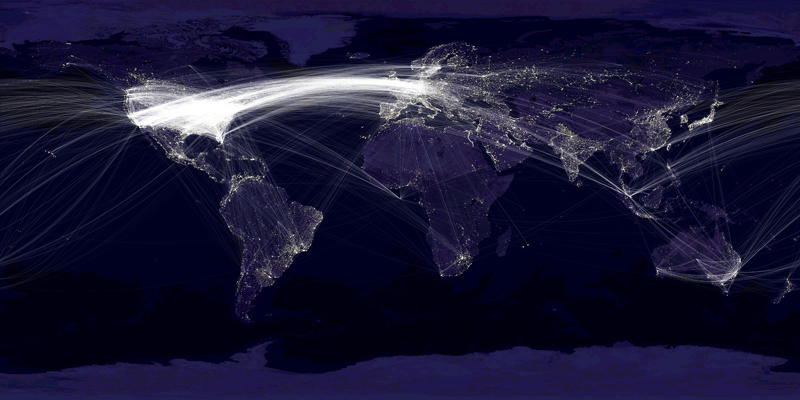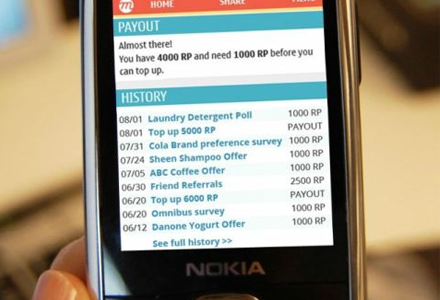‘Software is Eating the World’ (Including the BoP): GIZ’s upcoming sector workshop nets ICT practice, progress
In the 21st century bits and bytes are what fuel knowledge-driven economies. Access to information and the ability to create, change, distribute and understand data determine competitive advantage. In fact, code and algorithms drive change in every single industry. “Software is eating the world”, as the legendary venture capitalist Marc Andreessen put it in 2011.
Has anything changed since then? Not a bit. Rather, software is eating more of the world faster than ever – including the BoP. Indeed so fast, that even digital natives find it hard to keep up with emerging Information and Communication Technologies (ICT) and the buzzwords that accompany them: big data, cloud computing, location-based services, mobile applications, m-money, software-as-a-service. Although some of the technologies are just years old, they have already proven that they can destroy, create and revolutionize products, services, business models and even entire industries. This begs the question: if they are so powerful, how can companies serving low-income communities leverage them to make their business models more inclusive?
Leveraging ICT in four core business capacities
Our soon-to-be-published research with Intelecon Research on behalf of the German Federal Ministry for Economic Cooperation and Development (BMZ) shows exciting evidence that companies have succeeded in using ICT to do business with the poor in novel and promising ways. This is made possible by the now almost ubiquitous availability of mobile technologies, as evidenced by an all-time high mobile penetration rate of 89 percent in developing countries. Our findings show that companies can leverage ICT in four core business capacities. They can:
(1) improve market research,
(2) innovate pricing and payment design,
(3) expand marketing and deepen consumer relationships, and
(4) transform sales and delivery channels.
This leads to cost savings, increased revenues and improved business functions – and in the end to better and more inclusive business models.
Improving market research
Acquiring market data on BoP consumers’ preferences, spending habits and purchasing power is costly and challenging. This makes it difficult for companies to adapt their products and services to the needs of low-income clients. Companies can improve their market research by using mobile research platforms such as Jana, the world’s largest payment platform. By configuring its airtime platform to reward consumers in exchange for data on preferences and behaviors, Jana can collect data across regions in as little as two days. Through integration with the billing systems of over 235 mobile operators, Jana has the ability to reward 3.48 billion emerging market consumers. This enables companies to literally evaluate their target market in real-time and bring co-creation processes to scale.
(Left: A look at the Jana platform. Image: Jana)
Innovating pricing and payment design
Given their irregular cash-flow, consumers at the BoP tend to be risk-averse and avoid high upfront costs. Companies can leverage ICT to facilitate small, frequent payments instead, so that customers can tailor their usage to their income. The Berlin-based solar technology company Mobisol found a business model that acknowledges the inability of low-income users to pay large lump sums. Mobisol therefore provides them with solar home systems upfront and allows them to pay them off via mobile phone according to their usage. To ensure compliance, the company uses a remote monitoring system to turn off access to non-paying users – which represent less than 5 percent. This innovative payment design allows Mobisol to tap into a market of approximately 1.3 billion people that lack access to the electric grid. Three years after launch, Mobisol has sold more than 1,500 solar home systems in Tanzania, Kenya and Ghana, and aims to connect over 20,000 households to solar energy by 2015.
Expanding marketing and deepening consumer relationships
In low-income markets, customer acquisition costs are high and incentivizing consumer loyalty is challenging. Companies can develop innovative mobile-based products in order to create a unique selling point and increase consumer retention – as was done by mobile phone operator Tigo. To reduce churn and maintain customer loyalty, Tigo partnered with NGO MicroEnsure to create Tigo Family Care Insurance. This product insured existing users of the Tigo network based on their monthly airtime expenditure at no cost and offered an optional upgrade to a higher insurance coverage for a small monthly fee. Effectively doubling Ghana’s entire insurance market within a year, Tigo successfully increased customer loyalty by developing a creative yet simple ICT-based insurance product that consumers can trust.
Transforming sales and delivery channels
A company’s ability to successfully bridge the last mile can make or break its business model in BoP markets. Ensuring that products and services reach their customers in the intended quality is difficult, providing after-sales services to clients in remote villages even more so. Both is especially true in the health market and allowed PharmaSecure to venture into a niche market. The US-based company has coded more than 600 million medicine packages with unique barcodes, thereby allowing consumers in developing and emerging countries to verify medications via text message. Given the shockingly high numbers of counterfeit drugs, this can be a life-saving service. Furthermore, PharmaSecure provides its customers timely reminders when to take their medicine and additional health tips, a valuable service where doctors are few and far between.
Connect the BoP – practitioner workshop, webinar series and practitioner guide
Entrepreneurs interested in leveraging ICT for inclusive business can sign up for the Connect the BoP practitioner workshop and webinars.
The practitioner workshop will take place on Nov. 6-7 in Berlin. The two-day workshop will provide practical guidance for companies on how to leverage ICT to improve their inclusive business models. It builds on the previous BoP Sector Dialogues and is particularly geared towards company representatives from the ICT, energy, pharmaceutical, agricultural, microfinance and microinsurance sectors.
If you can’t wait, feel free to join the webinars leading up to the workshop set for 5 p.m. CET on Oct 9, 16 and 23.. Representatives of several of the companies mentioned in this article will present how they have successfully leveraged ICT and are happy to discuss their learning’s with you. To register and learn more about the webinars please click here.
The forthcoming practitioner guide is based on an analysis of more than 50 mobile applications and expert interviews and will be available later this year at www.giz.de/connect-the-bop.
ICT are no panacea, but powerful tools if used right
It would seem that if you don’t want to be eaten by software you better seize the opportunities that leveraging ICT can offer. While mobile technologies are certainly no panacea, they do provide entrepreneurs and companies serving low-income communities with powerful tools to co-create new products and services and innovate business models. We look forward to discussing and exploring these matters with you in the coming days and weeks online and – if you don’t mind the old fashioned way – offline too!
Matthew McDermott has been working on topics related to Inclusive Business, Base of the Pyramid markets and Social Entrepreneurship in the Business Unit Private Sector Cooperation of the Deutsche Gesellschaft für Internationale Zusammenarbeit (GIZ) since 2009. Lena Koever is currently assisting with the BoP Sector Dialogue “Connect the BoP” at the Business Unit Private Sector Cooperation of GIZ.
- Categories
- Technology, Telecommunications

